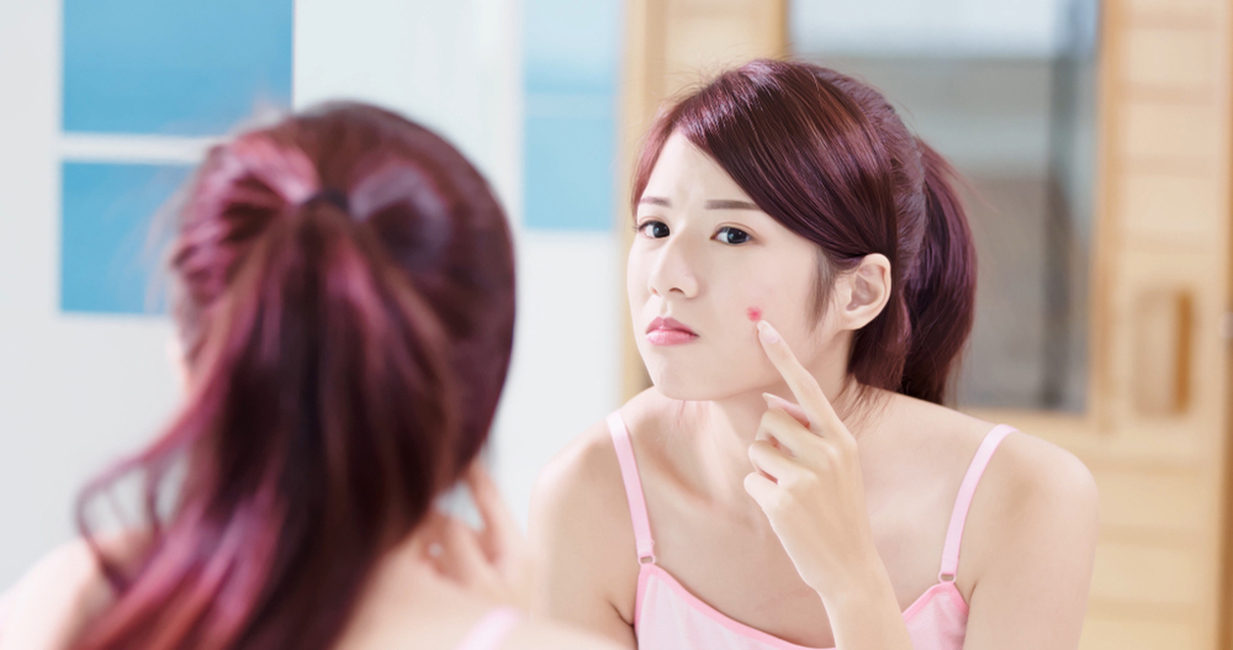
Is that reoccurring pimple telling you something? According to ancient Chinese and Ayurvedic techniques, it might — but there’s little to no scientific evidence that supports the idea that ear acne is caused by kidney issues or cheek acne is because of your liver.
As disappointed as we are to hear that, we’re also stoked to rectify these claims and create a face map based on evidence and science. Take a look at how to treat returning acne based on external, measurable lifestyle factors.
Acne around your hairline? Look at your hair care
Acne surrounding the hairline on your forehead also shares the name “pomade acne.” Pomades are in thick, often mineral oil-based hair products. This ingredient keeps the natural oil or sebum in our hair follicles from exiting. That blockage is what creates a pimple.
If you’re routinely finding yourself with pimples along your hairline, the best thing to do is stop using the pomade, wash your face after application, or be diligent about using a clarifying shampoo. There’s also products on the market that are noncomedogenic (nonclogging).
Acne on your cheeks? Check your phone and pillowcases
It’s not just fecal matter. You’ve probably got traces of E. coli and other bacteria on your phone, too. And anytime you hold your phone to your face, you’re spreading that bacteria to your skin, potentially causing more acne. Persistent acne on one side of your face tends to be due to dirty phones, pillowcases, and other habits like touching your face.
Cleaning your smartphone regularly with a disinfectant wipe can help minimize breakouts. If you’re on the phone frequently for work, consider purchasing a Bluetooth headset. Switch out your pillowcases at least once a week. For those who want to switch pillowcases daily, I suggest you to buy a pack of cheap cotton T-shirts and use it.
Acne on your jawline? It’s probably hormonal
Here’s where face mapping is actually accurate. Chin and jawline acne is often caused by fluctuations in hormones rushed Source, which means a disruption with your endocrine system. It’s typically a result of excess androgens, which overstimulate the oil glands and clog pores. Hormones can surge during a menstrual cycle (a week before your period) or may be due to a switch or start with birth control medications.
Hormone imbalance can also be related to diet. You may have heard how diet affects acne, but studies show there’s a weak correlation.
Instead, some researchers believe that gut health affects acne because it changes your hormone levels — especially if you’re eating high-carb foods or dairy with added hormones. Take a look at your diet and see if cutting back on sugars, white bread, processed foods, and dairy will help reduce acne.
Your cosmetologist or dermatologist can also help create and customize a strategy to help combat stubborn acne. For example, while traditional acne prescription regimens may help regular flare-ups, there are specific formulations of birth control pills and topical ointments that help, too.
Acne on your forehead and nose? Think oil
If you’re getting breakouts in the T-zone area, think oil and stress. A large-scale study found that high stress doesn’t have an effect on oil production, but it can make acne more serious.
Another study found that people who woke up tired were more likely to have acne as well.
So, it sounds like stress and sleep start a vicious cycle with acne. If you notice a pattern, try meditating before bed or practicing good sleep hygiene. Listening to music or exercising (even for one minute) are also natural ways to relieve stress.
And remember to avoid touching your forehead. The average person touches their face hundreds of times per day, spreading oils and dirt directly into the pores. If you have oily skin, it’s important to buy products according to your skin type.
If changing up your lifestyle and routine doesn’t help, talk to your cosmetologist about creating a treatment regimen to calm down acne and reduce the chances of scarring.